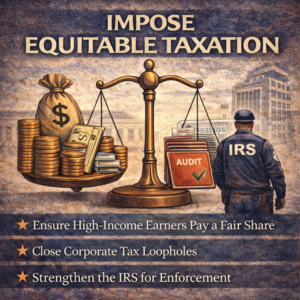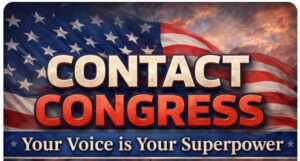Equitable Taxation

Core Ideas:
Why this issue is important
First: Trust in government. When people see the ultra-wealthy dodging taxes while they can’t, they lose faith in the entire system. Democracy requires legitimacy, and nothing erodes that faster than a two-tiered system where the rules apply differently depending on your bank account.
Second: Economic stability. Fair taxation means shared prosperity. When wealth concentrates at the very top, the economy becomes fragile. Middle-class spending drives economic growth, but middle-class families can’t spend when they’re overtaxed, while billionaires stash money in tax havens.
Third: Public services. Roads, schools, healthcare, and national defense don’t fund themselves. When corporations and the wealthy skip out on their obligations, guess who makes up the difference? You do. Or these services simply deteriorate.
Fourth: Political power. Extreme wealth concentration doesn’t just buy yachts—it buys influence. When the ultra-rich pay less than their fair share, they accumulate even more power to rig the system further in their favor.
And fifth: System efficiency. Complex loopholes cost billions to navigate and billions more to enforce. A simpler, fairer system where everyone pays what they owe actually costs less to administer and increases voluntary compliance.
Introduction:
You get your paycheck, and you pay your taxes– Social Security. Medicare. Federal income tax. State tax. You’re doing your part. You’re paying what you owe.
But here’s what might surprise you: Some of the wealthiest people in America, billionaires, multi-millionaires, are paying a lower tax rate than you are. And some of the most profitable corporations? They’re paying next to nothing.
This isn’t a conspiracy theory. It’s not left versus right. It’s about something fundamental: Everyone should pay their fair share. And right now, our tax system is broken.
Below is Project 2026’s plan for more equitable taxation.
📘Ensure High-Income Earners Pay a Fair Share
🎯 Objective:
Make the U.S. tax system more progressive by requiring the wealthiest individuals to contribute proportionally.
✅ Key Actions:
Minimum Tax for the Ultra-Wealthy: Impose a fixed minimum tax on households earning over $1 million annually, regardless of deductions or loopholes.
Equalize Capital Gains and Income Tax Rates: Tax capital gains and dividends at the same rate as ordinary income for high earners.
Eliminate the “Step-Up in Basis” Loophole: Tax unrealized gains at death above a set threshold to prevent tax-free inheritance of vast wealth.
Restore Estate Tax Thresholds: Lower the exemption to ~$5 million per individual (adjusted for inflation) to tax larger inheritances more fairly.
📘 Close Corporate Tax Loopholes and Ensure Global Fairness
🎯 Objective:
Ensure that corporations contribute fairly to public revenue, especially highly profitable multinational firms.
✅ Key Actions:
Corporate Minimum Tax: Enforce a 15% minimum effective tax rate on corporate profits (modeled after the Inflation Reduction Act provisions).
End Offshore Profit Shifting: Strengthen global minimum tax agreements to stop corporations from sheltering profits in tax havens.
Restrict Stock Buyback Favoritism: Impose a modest excise tax (e.g., 1–4%) on corporate stock buybacks to encourage reinvestment in workers and innovation.
Limit Accelerated Depreciation: Reduce overly generous tax deductions that allow companies to rapidly write off capital investments.
📘 Protect and Support Low and Middle-Income Families
🎯 Objective:
Ease the tax burden on working-class Americans while encouraging upward mobility.
✅ Key Actions:
Expand the Earned Income Tax Credit (EITC): Increase the value and eligibility of the EITC to help low-income workers.
Make the Child Tax Credit Fully Refundable: Restore expanded credits with monthly payments for families below a certain income threshold.
Standard Deduction Adjustments: Raise standard deductions to keep pace with inflation and real cost-of-living increases.
📘 Strengthen the IRS for Enforcement and Efficiency
🎯 Objective:
Increase compliance and fairness by improving tax collection and enforcement.
✅ Key Actions:
Fully Fund the IRS: Increase staffing and technology investment to improve audits, particularly of high-income earners and corporations.
Target High-Income Evasion: Focus audit efforts on individuals earning $500,000+ and profitable corporations exploiting complex shelters.
Modernize IRS Technology: Streamline digital filing, tracking, and communication systems to improve the taxpayer experience.
Free Public Tax Filing: Restore a government-run, no-cost online tax filing system to simplify filing for most Americans.
📘 Promote Long-Term Fiscal Stability and Public Trust
🎯 Objective:
Build a sustainable, fair revenue system that funds critical programs while preserving economic vitality.
✅ Key Actions:
Sunset Unfair Tax Breaks: Regularly review and phase out deductions and credits that disproportionately benefit the wealthy or serve narrow interests.
Transparent Budget-Tax Alignment: Ensure new spending proposals include revenue sources or offsets to avoid debt-driven tax cuts.
Tax Policy Review Board: Establish an independent, bipartisan panel to evaluate the fairness and effectiveness of federal tax policies every five years.
Public Education and Participation: Launch civic campaigns to explain how taxes fund public goods, aiming to restore confidence in the tax system.
TAKE ACTION – Contact Congress

(How to contact Congress) click here
Congressional Committees That Oversee Taxation
🏛 Senate Committee on Finance
-
Has jurisdiction over:
-
Taxation and revenue-related legislation
-
IRS oversight
-
Tax treaties and tax policy
-
Social Security, Medicare, and other tax-linked programs
-
🔑 Leads Senate efforts on tax reform, IRS operations, and tax compliance.
🏛 House Committee on Ways and Means
The primary committee for tax legislation in the House.
-
Has exclusive jurisdiction over:
-
Federal income tax
-
Corporate taxes
-
Payroll taxes (e.g., Social Security, Medicare)
-
Tariffs and other revenue-raising measures
-
-
Also oversees:
-
The IRS
-
Tax policy implementation by the Department of the Treasury
-
🔑 This is the most powerful tax-writing committee in Congress.
More on Project RAD’s issues

